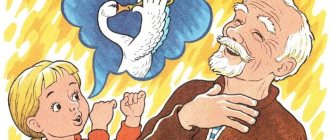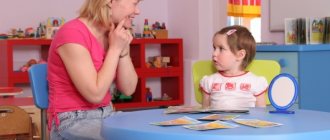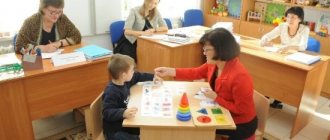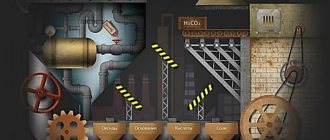How to make a presentation to a speech therapist for a parent meeting
At the beginning of the school year, the school speech therapist meets the parents of first-graders. He talks about himself and what he does with children. How he selects schoolchildren for classes, gives a lot of different information on other important issues. It is very good to support your speech with a pre-compiled presentation. The classroom equipment allows for presentations, and the benefits of this are undoubted.
Why do you need a presentation to a speech therapist?
As practice shows, parents do not remember the usual speech of a speech therapist. At the meeting, many strangers speak with a variety of questions. It can be difficult to maintain attention the entire time. A presentation helps you stand out and convey important information not only through speech, but also through video.
As a result:
- your information has been heard and you will not say the same thing to each of the parents;
- all necessary points are recorded;
- no need to raise your voice and repeat - just leave the slide a little longer to view,
- if necessary, you can easily return to the previous slide and not lose the thread of the story,
- nothing will be missed - you will definitely say everything you planned.
Preparing a presentation for a speech therapist does not take much more time than preparing a regular speech. A well-thought-out presentation can be used for several years, supplemented with relevant information from time to time.
How to make a presentation?
A speech therapist needs to know the general principles of making presentations. They are simple and easy to remember and then implement.
1. There should be few slides. Optimally 5-10 pieces. 2. Each slide must contain separate information. 3. Pictures should occupy most of the slide. 4. Use text to a minimum, only the most important. For example, what needs to be written down or what should be emphasized. 5. The human brain remembers images better, so use them.
Filling the slides
The content of the slides may be different, but there is something that must be indicated. The speech therapist’s presentation will roughly look like this.
Slide one: introduction
Introduce yourself. Write your last name, first name and patronymic, position, number of the office in which you work. If this is part of your plans, here you can also place a phone number where you can be contacted and the hours when this can be done. It is better to speak about your education, practice, and work experience in words. Give parents time to transfer the data from the slide to their notebooks. Please note: modern parents often do not write down information from slides, but take photographs of it. Therefore, highlight important points in bold and do not use a pockmarked background, which makes it difficult to perceive the text, or even disguises it.
Slide two: problem statement
Tell us why a speech therapist is needed at school. Here, provide information about problems specific to first-graders at your school. Perhaps unformed speech, lack of active attention, functional immaturity and others. It would be good if you could provide statistical data, including for your school. Only the names of the problems should appear on the slide (and if possible, thematic pictures); tell them in more detail orally.
Slide three: updating the problem
After listening to a number of problems, even with statistics, parents are unlikely to understand how serious they are. And most likely, they will not connect them with their child. Therefore, the problem needs to be updated. Tell us in an accessible way what speech therapy problems threaten first-graders. That there will be difficulties with reading comprehension, writing and literacy. A good sign is the parents' revival. Support him. You may be asked questions. Keep your answers short but clear.
Slide four: problem solving
Information can be located on 2-5 slides. You need to tell in detail what you do, how you help children settle into school, become more attentive, literate and smart. Adhere to the principle: on one slide - one problem, illustrated with a picture. Emphasize that the work will be carried out comprehensively and that parents are also involved in this. Start with how and when selection for classes will take place. Proceed to speech therapy support, individual and group work. Tell your story based on the picture on the slide.
Slide five: general recommendations
This is the final slide. It provides recommendations for daily work with children at home.
Typically there are three recommendations:
1. read aloud to the child, 2. communicate more often, 3. answer all the child’s questions, do not brush them aside, treat them with understanding.
Emphasize once again that if any questions arise, parents should not hesitate to contact you. Re-show your phone number, first and middle name, and time to call at the end of the slide.
Speech therapist Master consults and trains school speech therapists on-site and remotely. You can choose a suitable course or master class, including on all school aspects of the work of a speech therapist. All information is available on the website. You can sign up by phone or by filling out an application on the website. Improve your skills and your work will always delight you!
Presentation on the topic: advice from a speech therapist
Slide description: Advice from a speech therapist Consultations for parents Adaptation generally lasts from two to six months, depending on the individual characteristics of the first-grader. Some children lose weight by the end of the first quarter, many experience a decrease in blood pressure (which is a sign of fatigue), and some experience a significant increase (a sign of real fatigue). In many first-graders, parents observe headaches, fatigue, poor sleep, decreased appetite; doctors note the appearance of heart murmurs, neuropsychic health disorders and other ailments. The majority (56%) adapt within the first two months of training. These children relatively quickly join the team, get comfortable in the classroom, and make new friends; They are almost always in a good mood, they are calm, friendly, and fulfill the teacher’s demands conscientiously and without visible tension. The second group of children (30%) needs more time; for a month, and another, and a third, they can play in class or sort things out with a friend, without reacting to the teacher’s comments (or reacting with tears and hysterics). And things are not easy for them when it comes to mastering the curriculum. Only by the end of the first half of the year does their behavior become “correct.” The third group (14%) are children who, in addition to significant difficulties in academic matters, have difficulties of a more serious nature. They exhibit negative forms of behavior and sudden outbursts of negative emotions. If you do not understand the reasons for this behavior in time, it can lead to a nervous breakdown and mental health problems. It is during the first quarter that the number of students with neuropsychiatric disabilities increases by approximately 14-16%, and by the end of the school year the number of such children increases by approximately 20%. How to help..? The most basic thing is adherence to the regime. Following a daily routine allows the child to maintain physical and mental balance, which makes it possible to maintain emotional balance. After school, a first grader must first have lunch and rest. Relax in the air, in active games, in movement. For weakened children, the best rest would be an hour and a half nap in a well-ventilated room. Sleep also helps relieve stress on the musculoskeletal system. It is better to do lessons in the middle of the day. It is believed that brain activity has two peaks during the day: 9-12 hours and 16-18 hours, when it makes sense to do homework.
Presentation of the experience of speech therapists in Microsoft PowerPoint (ppt)
Today we decided to share our experience of speech therapists’ presentations in Microsoft PowerPoint (ppt). Also, we will accept for publication not very large works in PowerPoint (extension *.ppt). There are some size restrictions for technical reasons. RSS news feed.
25.04.2020
Technology for creating and using computer games using Microsoft Office PowerPoint for individual correctional work in speech therapy classes with children (4.77 MB) ©
Shlykova S. S.
, Certificate
25.04.2020
Development of phonemic processes, sound analysis and synthesis skills in first-graders with mental retardation using computer technology (3.58 MB) ©
Shlykova S. S.
, Certificate
13.06.2015
Games for teachers (1.12 MB) ©
Galka Igralka
, Certificate
30.07.2013
Automation and differentiation of sounds in poems, songs, proverbs and sayings, tongue twisters, long-twisters, chants, fables, folk songs (1.30 MB) ©
Polevskaya Eleonora Yurievna
, Certificate
17.06.2013
Self-presentation (1.72 MB) ©
Bulina Tatyana Ivanovna
, Certificate
17.06.2013
Articulation exercises using bioenergoplasty (2.11 MB) ©
Bulina Tatyana Ivanovna
, Certificate
17.06.2013
Game “Fairytale-pointer” (0.40 MB) ©
Bulina Tatyana Ivanovna
, Certificate
17.06.2013
Cossack ABC (1.21 MB) ©
Eleonora Yuryevna Polevskaya
, Certificate
17.06.2013
ABC of Novorossiysk (1.89 MB) ©
Polevskaya Eleonora Yurievna
, Certificate
17.06.2013
Presentation for an integrated lesson (Russian language - speech therapy) 2nd grade.
Topic: Vowel sounds and letters (3.69 MB) © Orlova L.I.
, Certificate
29.03.2013
Clinical, psychological and pedagogical characteristics of children with disabilities in diagrams (2.91 MB) ©
Elena Mikhailovna Maltseva
, Certificate
29.03.2013
Consultation for parents on the topic “Speech development of children 2-3 years old” (0.51 MB) ©
Elena Mikhailovna Maltseva
, Certificate
21.03.2013
Integrative education for children with disabilities: “FOR” and “AGAINST” (0.13 MB) ©
Naletova Ekaterina Anatolyevna
, Certificate
21.03.2013
Help Dunno (2.82 MB) ©
Stolyarova Elena Leonidovna
, Certificate
18.03.2013
Cognitive processes (0.40 MB) ©
Doroshova Elena Viktorovna
, Certificate
18.03.2013
Correction of phonemic perception disorders in preschoolers with phonetic-phonemic speech underdevelopment (0.94 MB) ©
Elena Viktorovna Doroshova
, Certificate
06.02.2013
Frontal speech therapy lesson (school preparatory group) Topic: “Transport” (3.38 MB) ©
Natalia
, Certificate
27.12.2012
Presentation for the parent meeting “Work on the formation of sound-letter analysis in children” (2.09 MB) ©
Zheludkova Natalya Vladimirovna
, Certificate
17.12.2012
Presentation for the lesson notes “Differentiation of sounds [t`-d`]” (in the publications section) (0.68 MB) ©
Ganieva Alsou Raifovna
, Certificate
17.12.2012
Presentation game “Riddles” (8.48 MB) ©
Novikova Larisa Petrovna
, Certificate
05.12.2012
Methods of speech therapy intervention for the dynamic form of aphasia (0.35 MB) ©
Doroshova Elena Viktorovna
, Certificate
14.11.2012
Presentation of a methodological manual on sound automation [L] (0.59 MB) ©
Utkina Nadezhda Nikolaevna
, Certificate
28.10.2012
Presentation for the GARDEN-VEGARDEN lesson (in the publications section) (2.09 MB) ©
Natalya Nikolaevna Korshunova
, Certificate
11.09.2012
Learning the sound “l” (1.50 MB) ©
Obidina Nadezhda Anatolyevna
, Certificate
01.09.2012
What is dysgraphia?
(0.98 MB) © Olga Leonidovna Chernyuk
, Certificate
18.08.2012
Formation of positive motivation of preschool children in individual correctional speech therapy classes on speech sound culture.
(5.43 MB) © Eremina Elena
, Certificate
30.07.2012
Techniques for pedagogical correction of extra-speech processes (and tactics in the publications section) (1.92 MB) ©
Sokolovskaya Natalya Petrovna
, Certificate
30.07.2012
Teaching children correct speech (and text in the publications section) (1.02 MB) ©
Sokolovskaya Natalya Petrovna
, Certificate
23.07.2012
Soft sign at the end of the word (and methodological recommendations in the publications section) (2.57 MB) ©
Nadezhkina Inna Viktorovna
, Certificate
23.07.2012
Speech therapy album for the little ones (1.82 MB) ©
Andreeva Margarita Sergeevna
, Certificate
21.06.2012
[Deleted by the author] (0 MB) ©
Konoryukova Inna Vladimirovna
, Certificate
21.06.2012
Development of logical thinking, speech, imagination and memory of preschoolers (2.75 MB) ©
Margarita Andreeva
, Certificate
25.05.2012
Complete literacy tasks (1.42 MB) ©
Andreeva Margarita Sergeevna
, Certificate
08.05.2012
Summary of the final lesson in the senior group of kindergarten (0.85 MB) ©
Kozlova Marina Sergeevna
, Certificate
05.02.2012
Game for a lesson on speech development (0.5 MB) ©
Marina
, Certificate
07.01.2012
Presentation on automating the sound “R” in children: The Adventures of Cheburashka (1.89 MB) ©
Firsanova L.V.
, Certificate
23.11.2011
Presentation on the formation of emotional vocabulary in preschoolers (4.51 MB) ©
Olga Solodko
, Certificate
13.11.2011
Presentation by speech therapist Tatyana Nikolaevna Timushkina (4.81 MB) ©
Tatyana Timushkina
, Certificate
10.11.2011
Children with attention deficit disorder and hyperexcitability: features, psychological, pedagogical and medical aspects, impact (0.26 MB) ©
State Educational Establishment SO RC “Rostok”
, Certificate
07.11.2011
Dysgraphia and dysorthography.
Occurrence, manifestation and possible ways of prevention (0.45 MB) © Irina Talalova
, Certificate
07.11.2011
Variable use of didactic games in correcting sound pronunciation of older preschoolers (3.42 MB) ©
Maryana
, Certificate






